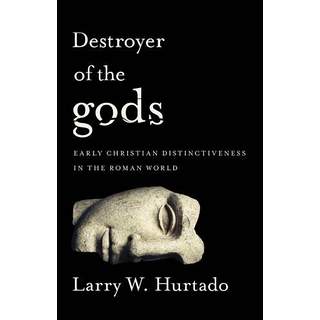Larry Hurtado’s new book, Destroyer of the Gods, which will emerge in a couple of weeks (Baylor, 2016 305 pages), is an important contribution to a goodly number of discussions about the formation of earliest Christianity, and whether or not it qualifies as a new or distinctive religion. In my view, its one of Larry’s best books. Accordingly, we will have a dialogue with Larry about the book on the eve of its release.
BEN: On p. 2 you talk about the earliest followers of Jesus believing that God had raised him from the dead, which is surely correct, but the thing is, this is not how they framed it. The eyewitnesses didn’t say ‘I believe Jesus rose from the dead’ they said ‘I saw him after his death and burial’ (for example the women at the tomb— ‘I have seen the Lord’). Now there is a difference between saying you believe or even think something is true or has happened, and saying ‘I saw X’. The earliest claim, as enshrined in 1 Cor. 15 is that Jesus ‘appeared’ (initiative coming from Jesus), to X,Y, Z and as a result they saw him. Not, they thought they saw him, or they merely believed they saw him, no they claimed to have seen him, and in some cases even claimed to have touched or eaten with him post mortem! In other words, part of the distinctiveness about early Christianity, it seems to me, is that they are not claiming to have had a vision of a dead person who is alive in the afterlife, they are claiming to have seen Jesus alive in the flesh again after his crucifixion on earth. Frankly, I don’t know of any sort of claim quite like this in the Greco-Roman world in general, not least because the Jewish notion of resurrection seems to have been foreign to most if not all of them. It sounded like the night of the living dead, or zombies to some of them, and Acts 17 is probably giving us a characteristic reaction to Paul mention resurrection— namely dismissal or laughter. So part of the question becomes more difficult— why in the world would a pagan swallow and accept claims like this and become a follower of Jesus? The more distinctive and disturbing the claims the more difficult it is to explain why people became Jesus devotees.
LARRY: We may disagree here, for I think you’re confusing the key claim, which I take to be Jesus’ resurrection/exaltation, with what often serves as the initial basis for that claim, “he appeared to X, Y, Z.” So, e.g., in 1 Cor 15:1-7, the key confession is that “Christ dies for our sins in accordance with the scriptures, that he was buried, and that he was raised on the third day in accordance with the scriptures” (vv. 3-4), and the appearances that follow serve to help certify those claims. Also, of course, resurrection-appearance narratives seem often to have been commissioning narratives, (as, e.g., in Matt 28:16-20; John 20:19-23). And note Paul’s linkage of his apostolic status with having “seen the Lord” (1 Cor 9:1).
Also, I think it’s important that Jesus is not described as brought “back” to life as we know it, but instead is catapulted “forward” into the immortality and eschatological existence that is then promised to those who put faith in him (e.g., 1 Cor 15:35-49). So, “in the flesh” isn’t how I’d describe things. A real body, and an empty tomb, you bet! But not a body of mortality, corruption, etc.
But, we also agree certainly that the claim about Jesus’ resurrection isn’t like any other of the time. It’s not the appearance of a loved one’s ghost in a vision or dream. It’s not also like those raised by Elijah or Jesus or the apostles in the biblical stories, who are “raised” back to mortal existence. Jesus’ resurrection as declared in the NT is the initial instance of the eschatological salvation that is to be shared through him with all the elect, a claim that shows some indebtedness to Jewish apocalyptic thought, but even so is a significance “mutation” of it.
Why did pagans (or Jews for that matter) buy the early Christian claim? There were more reasons not to do so than simply intellectual difficulties, as I’ve emphasized in a small book: Why on Earth Did Anyone Become a Christian in the First Three Centuries? Marquette Lectures in Theology, no. 47 (Milwaukee: Marquette University Press, 2016). I don’t think there’s an easy or one-size-fits-all answer. But, surely, there must have been powerfully persuasive and attractive factors!
















